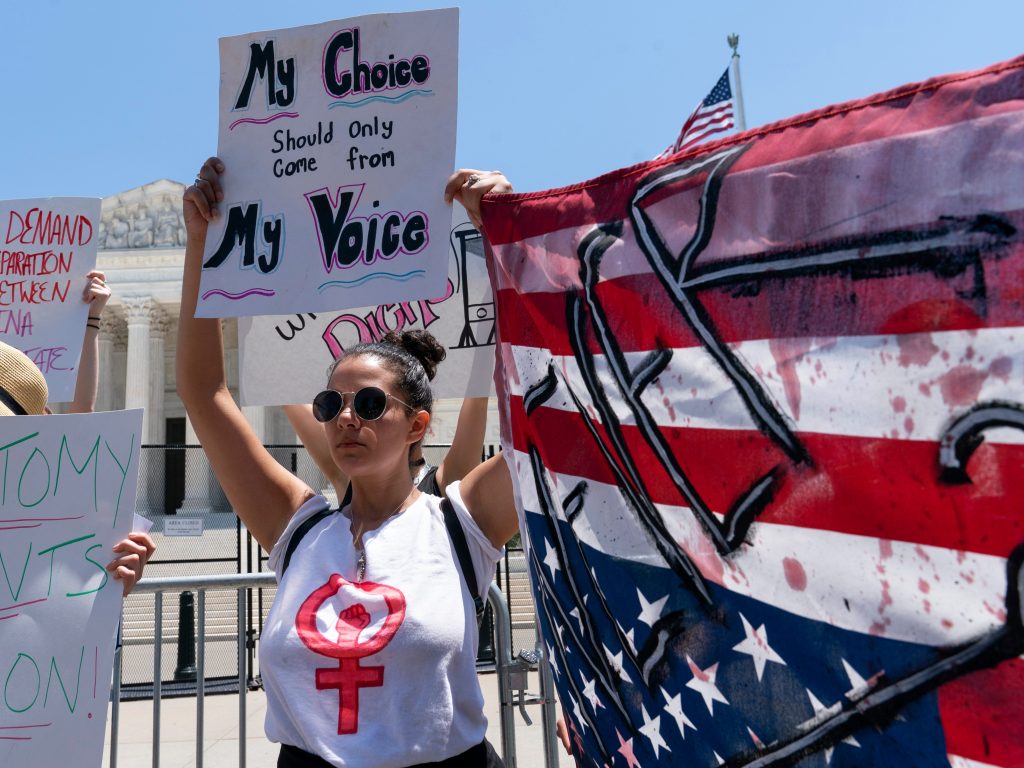- Democrats are under pressure to protect abortion rights since the Supreme Court overturned Roe v. Wade last Friday.
- But the constitutional right to an abortion is unlikely to be restored anytime soon.
- That's largely because of the Supreme Court's conservative majority and political gridlock in Congress.
Democrats in Washington are under immense pressure to protect abortion rights at the federal level in the wake of the Supreme Court's decision to end Roe v. Wade last Friday. But the half-century of nationwide reproductive rights is unlikely to be restored anytime soon.
One reason is that the Supreme Court's 6-3 conservative majority will be around for a while. To reinstate Roe and reverse Friday's ruling for the case Dobbs v. Jackson Women's Health Organization there would have to be a change in who sits on the bench. Unless the court holds a liberal majority, there appears to be zero appetite for abortion to become a constitutional right again.
"I don't think that we are going to see a reversal in Dobbs," Radhika Rao, a professor at the University of California Hastings College of Law, told Insider. "We're not going to see the return of the abortion right."
The Supreme Court
A majority of conservative justices, 5-4, handed down Friday's decision. Former President Donald Trump and a Republican-controlled Senate cemented that conservative tilt with three appointments to the bench: Justices Neil Gorsuch, Brett Kavanaugh, and Amy Coney Barrett, all of whom are in their 50s. Given their ages, the justices are likely to stay on the bench for at least a couple of decades to come, providing three reliable conservative votes.
"They're quite young. Their tenure in the court is going to be incredibly long," Rao said.
With the retirement of Justice Stephen Breyer, a liberal to be replaced by President Joe Biden's nominee Justice Ketanji Brown Jackson, the oldest members will now be conservative Justices Clarence Thomas, 74, and Samuel Alito, 72. But for Democrats to appoint their replacements, the circumstances will have to work in their favor.
"If it happened, we're talking about decades from now, after a couple of the conservatives die, and they just happen to die when the Democrat controls the White House and the Democrats control the Senate," Richard Pierce, a professor at George Washington University Law School told Insider.
Another pathway for Democrats to try to protect abortion rights would be to expand the court, which some members of the party have called for to offset its conservative majority. The US Constitution does not dictate the court's size, with the number of justices at one point being as high as 10. Congress has the power to decide.
But President Joe Biden has ruled that out. "That is not something that he wants to do," White House press secretary Karine Jean-Pierre told reporters over the weekend.
What about Congress?
Democrats have also been pressed to codify protections that existed under Roe v. Wade into federal law. Yet legislation in the Senate needs 60 votes to bypass the filibuster. And Democrats, with a tiny majority in the 50-50 Senate, do not have enough votes.
The party has also recently tried that: following last month's leak of the draft opinion overturning Roe v. Wade, an abortion-rights bill failed in the Senate by a 49-51 vote.
The other option would be to advance the bill on a party-line vote by eliminating the filibuster. But Democratic Sens. Joe Manchin of West Virginia and Kyrsten Sinema of Arizona have consistently been against tossing out the rule, putting the rest of their party in a bind.
Democrats push for voting to expand their majorities
That's why President Joe Biden, along with congressional leaders, including House Speaker Nancy Pelosi and Senate Majority Leader Chuck Schumer, have urged voters to elect more Democrats to Congress in this year's midterm elections so they can win larger majorities and approve legislation that would protect abortion rights.
Though if Democrats ever manage to codify Roe v. Wade into federal law, there remains the possibility of a future Republican president coming along, with Republican majorities in the House and Senate, which could repeal such a law and perhaps pass a national ban on abortion.
And codifying abortion rights, even if possible given the current makeup of Congress, could potentially face a legal challenge — one that would almost certainly end up at the Supreme Court.
"I think the court would immediately strike it down as being beyond Congress's power," Barry McDonald, a professor at Pepperdine University Caruso School of Law, told Insider.
This reality has left Democrats scrambling to protect abortion access nationwide. The Biden administration has already pledged to defend the right to obtain a medical abortion in all 50 states, citing the FDA's authority to regulate drugs. Though advocates have called for more actions, such as establishing abortion clinics on federal lands in states that have restricted the procedure and offering financial support to women who travel to get an abortion in a state where it's still legal. Since Friday, a slew of Republican-led states moved to restrict abortion, impacting roughly half of the country.
